Category: Stories
Conference Reflections – Farm to School
At the end of last year, we sent several advocates to the Community Food Systems Conference. Here's what they learned...
I learned about movement-building in food systems: the case of Puerto Rico, how people have the ability to sustain themselves, besides early colonial context, production, focused on exportation. Most of their produce comes from outside of the island. They are building a network collectively with people who want to work the land and have little or none knowledge of farming. Children start to learn about farming since first grade through third grade, they are bringing agricultural back and they are applying to math and science concepts. They are trying to influence in Public policy, GMO and pesticide regulation. I also enjoyed Winona LaDuke talk. She mentioned that abundance is the nature of life and discussed how to make America great again in the food access context. We need to farm something to feed our soul. We are interested in feeding the next generation of our people, this is where we will restore the food system. More consumers are seeking farm-fresh food and more farmers,-especially small- and mid-size operations are profiting from these new markers. I learned that every year the USDA awards up to $5 million in grants to help schools connect with local producers and teach children where their food comes from.As a FIN member, I think we can look for partnerships in schools to provide farming support to the children. Favorite Quote: “A country that doesn’t produce what it eats is not free” Jesus Vazquez Thanks FIN for such a great learning experience! -Gladis Clemente, FIN AdvocateMaraki – Start-Up Q&A
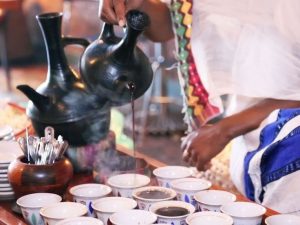 Maraki
Maraki
Maraki, established in 2016, is an Ethiopian coffee and catering business. Business partners Fanaye Gebeyaw and Lidia Tadlla provide Ethiopian coffee and healthy snacks through the traditional ceremony that is perfect for social occasions.
Service Area: Seattle and King County
Availability: Call us anytime
Contact: (206) 832-5979
Q: Tell us about your business
We come to you and make Ethiopian traditional coffee. You will be able to see how a very tasty and original Abyssinica coffee is made, from roasting the fresh beans to brewing. You'll taste our coffee with a healthy snack in the comfort of your own home or at an event.
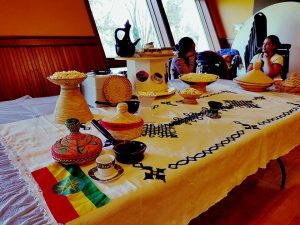 Maraki began catering with the support of Food Innovation Network. In Ethiopia, the traditional way to drink coffee is around coffee stands that hold cups where friends and family members gather, chat, share ideas and have coffee. Maraki pairs traditional coffee with high-quality healthy snacks in the homely and relaxed atmosphere of a client's own space. We meld pure socialization with our traditional Ethiopian coffee ceremony. With high standards and reliable delivery schedules, we have been able to build and maintain a solid customer base within a short period of time in King County. As founders, we are both experienced in Ethiopian and western foods, give high priority to quality and healthy food.
Q: What inspired you to start this business?
We were inspired to take the influential culture from Ethiopia and do the same in our local atmosphere. The major inspiring factor for Maraki to start the business was the lack of culture we, as Ethiopians, noticed in the US. With this business, there will be more cultural festivities and an atmosphere just like Ethiopia.
Q: What makes you different from other types of coffee businesses?
Maraki provides unique service to its customers, we serve Ethiopian coffee with its traditional ceremony. The client watches as we roast the coffee bean which is directly imported from its origin, Ethiopia. Coffee catering is suitable to any social gathering- family, work or public. Our coffee ceremony highly facilitates social interaction. It creates a friendly and relaxed environment while enjoying our tasty coffee and healthy snack.
Q: What do you like best about your work?
Maraki began catering with the support of Food Innovation Network. In Ethiopia, the traditional way to drink coffee is around coffee stands that hold cups where friends and family members gather, chat, share ideas and have coffee. Maraki pairs traditional coffee with high-quality healthy snacks in the homely and relaxed atmosphere of a client's own space. We meld pure socialization with our traditional Ethiopian coffee ceremony. With high standards and reliable delivery schedules, we have been able to build and maintain a solid customer base within a short period of time in King County. As founders, we are both experienced in Ethiopian and western foods, give high priority to quality and healthy food.
Q: What inspired you to start this business?
We were inspired to take the influential culture from Ethiopia and do the same in our local atmosphere. The major inspiring factor for Maraki to start the business was the lack of culture we, as Ethiopians, noticed in the US. With this business, there will be more cultural festivities and an atmosphere just like Ethiopia.
Q: What makes you different from other types of coffee businesses?
Maraki provides unique service to its customers, we serve Ethiopian coffee with its traditional ceremony. The client watches as we roast the coffee bean which is directly imported from its origin, Ethiopia. Coffee catering is suitable to any social gathering- family, work or public. Our coffee ceremony highly facilitates social interaction. It creates a friendly and relaxed environment while enjoying our tasty coffee and healthy snack.
Q: What do you like best about your work?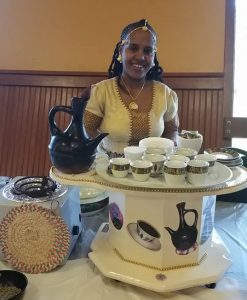 We enjoy working with clients and like to see customers satisfied with our service. It's always a pleasure to socialize with people during the coffee ceremony and seeing them smile.
Q: What is your business’ biggest challenge?
Our biggest challenge so far is working capital. We would like to reach out many customers and participate in festivals but the working capital is a major challenge to meet that demand.
Q: What is something people might be surprised to learn about you or your business?
One interesting thing is that both owners are health professionals promoting healthy lifestyle and equity. When we initially established Maraki it was to introduce healthy Ethiopian food and coffee ceremony to the Western community. We believe we can create a healthy community through socialization and understanding each other’s culture.
Q: What types of services or programs have been helpful?
FIN services have been helpful for the success of Maraki as a catering service. The Network has supported us in accessing a commissary kitchen, creating a forum to network with potential customers, and facilitating us to get our business license and health permits.
We enjoy working with clients and like to see customers satisfied with our service. It's always a pleasure to socialize with people during the coffee ceremony and seeing them smile.
Q: What is your business’ biggest challenge?
Our biggest challenge so far is working capital. We would like to reach out many customers and participate in festivals but the working capital is a major challenge to meet that demand.
Q: What is something people might be surprised to learn about you or your business?
One interesting thing is that both owners are health professionals promoting healthy lifestyle and equity. When we initially established Maraki it was to introduce healthy Ethiopian food and coffee ceremony to the Western community. We believe we can create a healthy community through socialization and understanding each other’s culture.
Q: What types of services or programs have been helpful?
FIN services have been helpful for the success of Maraki as a catering service. The Network has supported us in accessing a commissary kitchen, creating a forum to network with potential customers, and facilitating us to get our business license and health permits.
Want to brighten up your next social event?
Call Lidia & Fanaye today!
Start-Up Q&A: Mian Dian Noodles
[caption id="attachment_1834" align="alignright" width="300"]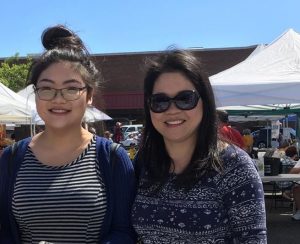 Yanzhi and her daughter, Manchun Yu[/caption]
Yanzhi and her daughter, Manchun Yu[/caption]
Mian Dian Noodles
Mian Dian is an authentic Chinese catering company run by Yanzhi Zhang and her daughter, Manchun Yu. Together, they make handmade food like they used to enjoy in China. Service Area: Within 20 Miles of Kent Availability: Delivery on Saturday and Sundays Contact: 425-524-2721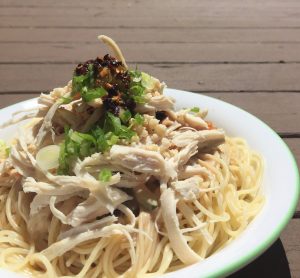 Q: What inspired you to start Mian Dian Noodles?
When I first came to the US, I was surprised and delighted by how much Americans love Chinese food. But after a while, I discovered that most Chinese food sold here has been modified to suit an American palate. American Chinese food has been this way since the 1920s and is far from the kind of food I had back in China. So, I decided to make it my mission to provide Americans with an opportunity to experience real, authentic Chinese food, and provide Chinese people with the food they had back home.
Q: What makes you different from other types of Chinese food?
My daughter and I both grew up with authentic Chinese food handmade by our loved ones. Every part of our lives was embraced by our traditions and our food. We want to spread the blessing we've had to Americans.
Q: What inspired you to start Mian Dian Noodles?
When I first came to the US, I was surprised and delighted by how much Americans love Chinese food. But after a while, I discovered that most Chinese food sold here has been modified to suit an American palate. American Chinese food has been this way since the 1920s and is far from the kind of food I had back in China. So, I decided to make it my mission to provide Americans with an opportunity to experience real, authentic Chinese food, and provide Chinese people with the food they had back home.
Q: What makes you different from other types of Chinese food?
My daughter and I both grew up with authentic Chinese food handmade by our loved ones. Every part of our lives was embraced by our traditions and our food. We want to spread the blessing we've had to Americans.
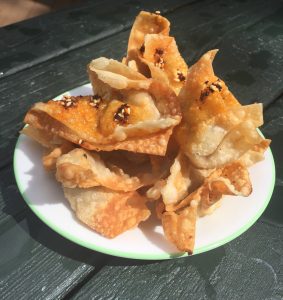 Q: What do you like best about your work and what is most challenging?
Spending time with my daughter while planning the future of our business. Also being able to share the most important part of our culture with so many people through Chinese cuisine. My daughter and I both have day jobs, so it's very challenging for us to have time for a business.
My daughter and I both have day jobs, so it's very challenging for us to have time for a business. My daughter and I have only been in the US for three years, though, and from difficulties with everyday activities to owning a business, we have come a long way.
Q: What types of services or programs have been helpful?
The project feast training I received two years ago has helped me out a lot in the process of creating my business. I learned a lot about the how to use a commercial kitchen, which I had no experience with before.
Q: What would you say to other small food business owners thinking of working with FIN?
If they have the opportunity to work with FIN, I highly encourage them to do so. FIN has provided us with all the resources that we needed along the way, they have helped me to make my dream come true.
Q: What do you like best about your work and what is most challenging?
Spending time with my daughter while planning the future of our business. Also being able to share the most important part of our culture with so many people through Chinese cuisine. My daughter and I both have day jobs, so it's very challenging for us to have time for a business.
My daughter and I both have day jobs, so it's very challenging for us to have time for a business. My daughter and I have only been in the US for three years, though, and from difficulties with everyday activities to owning a business, we have come a long way.
Q: What types of services or programs have been helpful?
The project feast training I received two years ago has helped me out a lot in the process of creating my business. I learned a lot about the how to use a commercial kitchen, which I had no experience with before.
Q: What would you say to other small food business owners thinking of working with FIN?
If they have the opportunity to work with FIN, I highly encourage them to do so. FIN has provided us with all the resources that we needed along the way, they have helped me to make my dream come true.
Want to experience authentic Chinese food?
Call Yanzhi today!
Start-Up Q&A: Jazie Fresh Meals
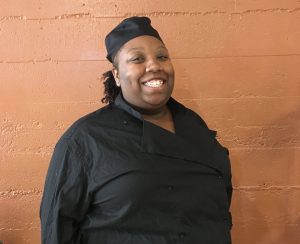 Jazie Fresh Meals
Jazie Fresh Meals
Jazie Fresh Meals is an on-demand weekly meal service that was just launched this year (2017) in Kent. Owner and chef Jasmin King joins us for an interview as one of FIN's newest Entrepreneurs.
Service Area: Pick Up or Free Delivery in Kent, $5-$10 from Tacoma to North Seattle
Availability: Orders Filled Every Sunday
Contact: (253) 259-4767
Website: jaziefreshmeals.weebly.com
Q: Tell us about your business?
I produce freshly made meals every week, which are rapidly cooled and may be reheated and consumed by my customers through the week. These meals are never frozen and are made with fresh ingredients, many of which are locally sourced. New menus are available every Wednesday and customers order by Friday for either pickup or delivery on Sunday. Customers can pick and choose how many meals and entrees they’d like to purchase and there is a discount for a full week’s worth of meals.
Q: How did you get the idea for your business? What inspired you to 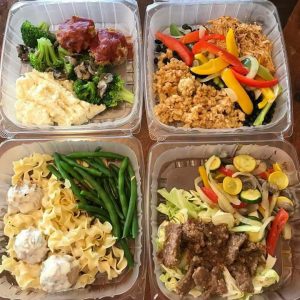 start this business?
When I started on my journey to eat healthier meals regularly, I realized how much time I put into preparing these meals. While I had the extra time, I knew most people wouldn't. I also researched blogs of folks trying meal preparation on their own. A common struggle was that people would end up having the same meal for a week at a time.
I want to help people get into a healthy eating lifestyle while not having to get stuck in the bland and boring routine that comes with not having enough time.
Q: What makes you stand out from restaurants?
My meals are prepared and quickly cooled so that you can reheat them on your own time, over the course of the week. However, a typical restaurant meal, even if it’s healthy, will only stay fresh for a day or two. Since my meals are not made for service and you receive them cold, they are able to be kept fresh for a week instead of only a couple of days like leftover takeout.
Also, unlike restaurants, my menus also change on a weekly basis so that you don't get stuck with the same five meals every week.
Q: What do you like best about your work?
I love to cook and create new dishes. The task of making them so that they keep and taste good after reheating plus the challenge of keeping them low calorie always keeps me on my toes to create something new.
Q: What is your business’ biggest challenge?
start this business?
When I started on my journey to eat healthier meals regularly, I realized how much time I put into preparing these meals. While I had the extra time, I knew most people wouldn't. I also researched blogs of folks trying meal preparation on their own. A common struggle was that people would end up having the same meal for a week at a time.
I want to help people get into a healthy eating lifestyle while not having to get stuck in the bland and boring routine that comes with not having enough time.
Q: What makes you stand out from restaurants?
My meals are prepared and quickly cooled so that you can reheat them on your own time, over the course of the week. However, a typical restaurant meal, even if it’s healthy, will only stay fresh for a day or two. Since my meals are not made for service and you receive them cold, they are able to be kept fresh for a week instead of only a couple of days like leftover takeout.
Also, unlike restaurants, my menus also change on a weekly basis so that you don't get stuck with the same five meals every week.
Q: What do you like best about your work?
I love to cook and create new dishes. The task of making them so that they keep and taste good after reheating plus the challenge of keeping them low calorie always keeps me on my toes to create something new.
Q: What is your business’ biggest challenge?
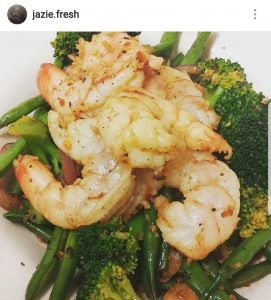 I think the biggest challenge will be growing customer base. I am sure that once word gets out it will be much easier to keep up business. But since I’m just beginning, it may be very slow for a while.
Q: What is something people might be surprised to learn about you or your
Cooking was not my first choice in careers. I was originally interested in science, but once I started cooking meals at home I became more interested and realized how much science went into cooking. I really saw how much more fun it was to create dishes and l knew it was what I wanted to do.
Q: What types of services or programs have been helpful?
Culinary school and working in kitchens have definitely been helpful in my journey and now that I am starting I can't wait to work with FIN and Ventures. I have only begun my journey with them and am looking forward to the extra support.
Get in touch with Jasmin and check out her Facebook page for the latest menus!
I think the biggest challenge will be growing customer base. I am sure that once word gets out it will be much easier to keep up business. But since I’m just beginning, it may be very slow for a while.
Q: What is something people might be surprised to learn about you or your
Cooking was not my first choice in careers. I was originally interested in science, but once I started cooking meals at home I became more interested and realized how much science went into cooking. I really saw how much more fun it was to create dishes and l knew it was what I wanted to do.
Q: What types of services or programs have been helpful?
Culinary school and working in kitchens have definitely been helpful in my journey and now that I am starting I can't wait to work with FIN and Ventures. I have only begun my journey with them and am looking forward to the extra support.
Get in touch with Jasmin and check out her Facebook page for the latest menus!
Gladis Clemente – Advocate Profile
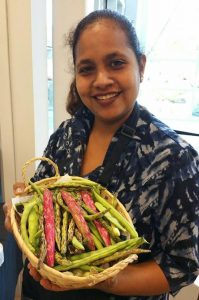 Civic advocacy is in her blood.
Gladis grew up in a small town outside of Acapulco in Mexico where her father was elected mayor not just once but three times. Politicians have a reputation for being rich and out of touch with their constituents in Mexico. Contrary to this, her parents came from a humble lifestyle and always stayed close to their community. Gladis remembers her parents explaining that she would attend public school because education is the most powerful way to change the world. Now, Gladis carries the lessons from her parents into her work with in the US.
Gladis joined FIN in 2016 as an advocate because she wanted to work on closing the opportunity gap in South King County communities. Although being a FIN advocate was her first paid job in the US, Gladis has worked hard as a mother, volunteer, and advocate for education reform. Even in the last year, she has been organizing, speaking up, and making connections like crazy. In March of 2017, Gladis participated in a FIN Government 101 training where she connected with Washington CAN, a local advocacy group. She’s since partnered with them to advocate for education reform like universal pre-school, increased funding for dual language programs, and support for immigrant parents.Meanwhile, she’s also become known in the FIN office as the go-to person for budgeting after she volunteered to learn about budgeting for the advocate program.
Civic advocacy is in her blood.
Gladis grew up in a small town outside of Acapulco in Mexico where her father was elected mayor not just once but three times. Politicians have a reputation for being rich and out of touch with their constituents in Mexico. Contrary to this, her parents came from a humble lifestyle and always stayed close to their community. Gladis remembers her parents explaining that she would attend public school because education is the most powerful way to change the world. Now, Gladis carries the lessons from her parents into her work with in the US.
Gladis joined FIN in 2016 as an advocate because she wanted to work on closing the opportunity gap in South King County communities. Although being a FIN advocate was her first paid job in the US, Gladis has worked hard as a mother, volunteer, and advocate for education reform. Even in the last year, she has been organizing, speaking up, and making connections like crazy. In March of 2017, Gladis participated in a FIN Government 101 training where she connected with Washington CAN, a local advocacy group. She’s since partnered with them to advocate for education reform like universal pre-school, increased funding for dual language programs, and support for immigrant parents.Meanwhile, she’s also become known in the FIN office as the go-to person for budgeting after she volunteered to learn about budgeting for the advocate program.
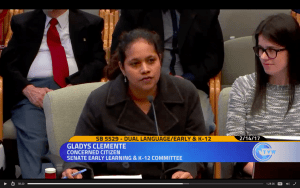
“We must educate people to change the system. Get them to see reality is on both sides....We must prioritize civic engagement.”
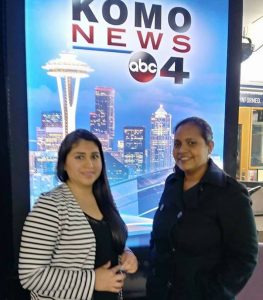 There are many issues she advocates for but ultimately, Gladis says the most important thing to get others to speak up as well. Over the last year, she has gained confidence and overcome her own barriers of public speaking in a mixed community. She thinks back to the first time she spoke in front of lawmakers in Olympia and knows how intimidating it feels. She believes that if more people speak up, lawmakers will listen – but the challenge is in getting people to talk. This is part of what makes Gladis such an effective community advocate, she sees the value in both helping people and working to change the system at the same time.
There are many issues she advocates for but ultimately, Gladis says the most important thing to get others to speak up as well. Over the last year, she has gained confidence and overcome her own barriers of public speaking in a mixed community. She thinks back to the first time she spoke in front of lawmakers in Olympia and knows how intimidating it feels. She believes that if more people speak up, lawmakers will listen – but the challenge is in getting people to talk. This is part of what makes Gladis such an effective community advocate, she sees the value in both helping people and working to change the system at the same time.
Gladis wants people to know that it’s possible for people to create their own opportunities. The only way to make a difference is to walk through a door and become involved – ask questions and volunteer to help out. Anyone can make a difference in a community.
Madeleine Kabena – Advocate Profile
Two days after arriving in the US, Madeleine Kabena found herself in an emergency room with her five-year-old daughter, Aline. Despite how it sounds, this was exactly why Madeleine and her family applied for the Diversity Visa lottery that allowed them to immigrate. They came here to find treatment for Aline, who was born with a genetic disorder. Although her health problem doesn’t have a cure, regular treatments can vastly improve both symptoms and outlook. At home in the Congo, treatment was limited and the threat of malaria loomed daily.
[caption id="attachment_1737" align="alignright" width="225"]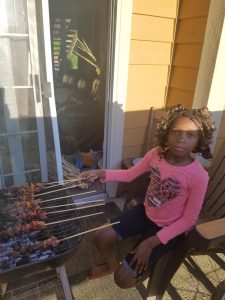 Madeleine's daughter[/caption]
While Madeleine brought her family here so her daughter could have a better life, it hasn’t all been easy. At first, it was a high to be in the United States but then reality began to sink in. There were the usual things, like learning a new language, but also some deeper issues. Food at the hospital was not good and she wasn’t finding traditional foods in her neighborhood. In the Congo, there are more than 200 cultures and what connects them all is the belief in good food. It is even thought that some disease can be healed through a healthy and nourishing diet. In fact, this is what Madeleine believes allowed her daughter to survive so long without regular treatments.
Madeleine's daughter[/caption]
While Madeleine brought her family here so her daughter could have a better life, it hasn’t all been easy. At first, it was a high to be in the United States but then reality began to sink in. There were the usual things, like learning a new language, but also some deeper issues. Food at the hospital was not good and she wasn’t finding traditional foods in her neighborhood. In the Congo, there are more than 200 cultures and what connects them all is the belief in good food. It is even thought that some disease can be healed through a healthy and nourishing diet. In fact, this is what Madeleine believes allowed her daughter to survive so long without regular treatments.
[caption id="attachment_1744" align="alignleft" width="169"]“Luckily I found that Chinese and Hispanic produce is very similar to Congolese. I shop there for vegetables like cassava, okra, and greens.”
 Madeleine with her daughter[/caption]
By searching for culturally appropriate foods, Madeleine discovered a distinct lack of Congolese shops, restaurants, or even organizations in King County. In all her asking around for connections to food, she eventually met a Congolese man who called himself a ‘Community Food Advocate.’ Madeleine was intrigued and hopeful. Over the first few years in the US, she worked as a caregiver at Wesley Homes. Her first profession was as a lawyer but her degree didn’t permit her to practice in the US. Becoming an advocate with FIN allowed her to represent people again while also building food connections for her community.
Madeleine with her daughter[/caption]
By searching for culturally appropriate foods, Madeleine discovered a distinct lack of Congolese shops, restaurants, or even organizations in King County. In all her asking around for connections to food, she eventually met a Congolese man who called himself a ‘Community Food Advocate.’ Madeleine was intrigued and hopeful. Over the first few years in the US, she worked as a caregiver at Wesley Homes. Her first profession was as a lawyer but her degree didn’t permit her to practice in the US. Becoming an advocate with FIN allowed her to represent people again while also building food connections for her community.
Madeleine’s hopes for the Congolese community in King County are the same as her hopes for her own family. In her own words... “I want people to have the best chance at life. And for us, that starts with things like healthcare and jobs but always ends with food and family.”“Unlike what I see in the Latino and Somali communities, the Congolese community here is small and very spread out. We sometimes struggle to connect with each other.”
Swahili Food Seattle
Startup Q&A: Swahili Food Seattle
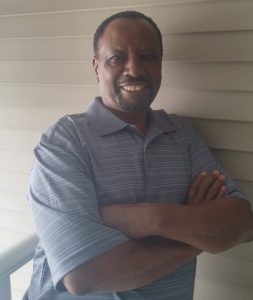 Benson, Owner of Swahili Food Seattle[/caption]
Benson, Owner of Swahili Food Seattle[/caption]
Q: Tell us about your business?
I cater East African food across King County communities. I cater small occasions, birthdays, graduations, small parties and individual meal orders. The African community loves my food because it meets their cultural appetite and is affordable. I’ve found there is a lot of interest in Kenyan cuisine outside the African community as well and I always enjoy meeting people who want to try African foods.Q: How did you get the idea for your business? What inspired you to start this business?
I saw that many Kenyans were getting very busy and did not have time to cook traditional meals. I worked in the food industry back in Kenya and have always loved to cook, I realized I could fill that need. I was number four in a family of twelve, I started cooking at a young age and everyone in my family loved my food. When I came to America, I saw that many Kenyans were busy and did not have time to cook traditional meals. The idea to start a catering business came very easily to me and I did not enjoy any other kind of job when I came to America. When I talked to family and people who knew me back in Kenya, they would always tell me I needed to start a Kenyan food business.Q: What makes you different from other types of African restaurants and caterers?
[caption id="attachment_1658" align="alignright" width="300"]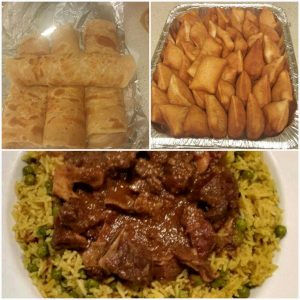 Chapati, Samosas, and Goat Stew[/caption]
My recipes are based on traditional Kenyan dishes but I improvise changes that give them a local Seattle flavor as well. I learned to cook from generations of family traditions and have carried these traditions with me to America. My cooking is made from organic produce and fresh spices from Africa’s spice capital of Zanzibar – you will not be able to have only one taste.
I also cater to special needs and my clients’ timeline – responding to calls and making deliveries outside normal business hours
Chapati, Samosas, and Goat Stew[/caption]
My recipes are based on traditional Kenyan dishes but I improvise changes that give them a local Seattle flavor as well. I learned to cook from generations of family traditions and have carried these traditions with me to America. My cooking is made from organic produce and fresh spices from Africa’s spice capital of Zanzibar – you will not be able to have only one taste.
I also cater to special needs and my clients’ timeline – responding to calls and making deliveries outside normal business hours
Q: What do you like best about your work?
Flexibility, the joy of seeing people appreciate my food and services, I enjoy interacting with people and sharing the experience and food from my culture. It is always fun to meet people who have visited Kenya and for those who can’t make it all the way to Africa, I am pleased to bring my culture to them.Q: What is your business’ biggest challenge?
I am trying to grow my business so I can have my own commercial kitchen. I don’t want to run a restaurant but instead to provide catering services and supply local restaurants and grocery stores with fresh Kenyan food. In order to do this, I need capital to buy equipment and, eventually rent a large space to work from. I am challenged by financial resources to grow my business, hire staff, and expand my business ideas. For now, I am focusing on building my catering business and marketing to new customers.Q: What is something people might be surprised to learn about you or your business?
That I never went to school to learn cooking skills, they can’t understand how I taught myself to cook such tasty food.Q: What types of services or programs have been helpful?
I’m telling you, I learned something I could not have imagined with I joined FIN. I knew that I could own a business but not necessarily how to do it. For instance, I learned how to operate in a commercial kitchen and how to scale recipes for large orders. Before this I cooked by feel and taste but I needed to learn how to measure and create consistency between dishes. My next adventure will be to improve my marketing skills. [caption id="attachment_1663" align="alignleft" width="288"] Benson cooking from the FIN booth at the Federal Way Farmers Market[/caption]
Q: What would you say to other small food business owners thinking of working with FIN?
That FIN is the ultimate program for people like me with a passion for food business. I would encourage other immigrants to join FIN and be intentional about taking the advantage of available resources, FIN has resources that can meet their every food business need, their financial support is very practical, I can’t believe they paid my public health permit, there is nowhere else you can find this kind of support, FIN has treated me like a parent treats and cares about a child, it is a unique program if you are committed to the process. I would encourage them to be very persistent to the process.
Benson cooking from the FIN booth at the Federal Way Farmers Market[/caption]
Q: What would you say to other small food business owners thinking of working with FIN?
That FIN is the ultimate program for people like me with a passion for food business. I would encourage other immigrants to join FIN and be intentional about taking the advantage of available resources, FIN has resources that can meet their every food business need, their financial support is very practical, I can’t believe they paid my public health permit, there is nowhere else you can find this kind of support, FIN has treated me like a parent treats and cares about a child, it is a unique program if you are committed to the process. I would encourage them to be very persistent to the process.
Connect with Benson to make an order or volunteer.
P.S. Benson would love help with creating marketing materials.
Reflections from Community Kitchen #2
We just finished FIN's 2nd community kitchen event at the SeaTac community center. I was excited because it was 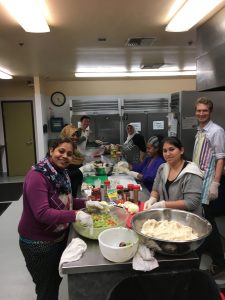 open to the whole community and many people showed up from the City of SeaTac and Highline College. It was such a great experience to work with new people in the kitchen. I think everyone enjoyed the food and were happy about this event - the most important thing is that people walked out with new friends and new ideas.
A big THANK YOU to everyone that helped out. We couldn’t do it with our wonderful advocates; Gladis, Lidia, Muslima, Zozan and myself. Thank you for sharing dishes from your countries.
We are also thankful to all the volunteers, Seth Schromen- Wawrin, Colleen Brandt- Schluter and Erika Martinez we couldn’t do with our help in the kitchen. Brian Tomisser and So Won Kim for organizing event and welcoming guests.
If you missed this community kitchen, stay tuned for the next one coming in Fall 2017!
Sheelan Shamdeen
June, 15,2017
open to the whole community and many people showed up from the City of SeaTac and Highline College. It was such a great experience to work with new people in the kitchen. I think everyone enjoyed the food and were happy about this event - the most important thing is that people walked out with new friends and new ideas.
A big THANK YOU to everyone that helped out. We couldn’t do it with our wonderful advocates; Gladis, Lidia, Muslima, Zozan and myself. Thank you for sharing dishes from your countries.
We are also thankful to all the volunteers, Seth Schromen- Wawrin, Colleen Brandt- Schluter and Erika Martinez we couldn’t do with our help in the kitchen. Brian Tomisser and So Won Kim for organizing event and welcoming guests.
If you missed this community kitchen, stay tuned for the next one coming in Fall 2017!
Sheelan Shamdeen
June, 15,2017
Healthy Kids Day
Last Saturday, FIN advocates, along with other partners, attended the YMCA's Healthy Kids Day and hosted a cooking station to demonstrate to kids and parents how fun and easy it is to eat healthy food. Here's what Gladis had to say about the experience: "It was a great experience for me to participate in the Healthy kids event at Matt Griffin YMCA. It was the first time that I have the opportunity to teach hands on how to make guacamole, which is a food that represents my culture and it is also a healthy dip made from vegetables.I really enjoy knowing that a healthy recipe can make a difference in somebody's life, especially with children and since this event was family friendly, many families could taste and learn from scratch how to make this food.I am very thankful to FIN for give me the chance to connect with the community through food." - Gladis Clemente [gallery ids="1449,1450,1451,1452,1453" orderby="rand"]
Zozan Shamdeen – Advocate Profile
One thing Zozan’s family has taught her is not to be afraid. But as a refugee, she hasn’t always been able to freely go after her dreams – even after making it to the US. Her family came this country as refugees from Iraq when Zozan was in middle school. By high school she dreamed about becoming a pediatrician and was on track to receive her green card and enter college.
[caption id="attachment_1430" align="alignright" width="300"]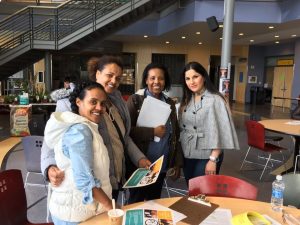 Zozan with fellow advocates.[/caption]
A clerical error over a date in her documentation caused all of that to be put on hold. She spent the next five years in legal limbo – all documentation had been revoked. And while her siblings all received citizenship, she was working with an immigration lawyer. Deportation loomed as an ever-present threat. Immigration officials told her not to worry, that in the event of deportation she would receive $200 and a plane ticket to Baghdad. As if a small amount of cash and a plane ticket to an unfamiliar city felt reassuring.
In the end, she was approved for a green card with the condition that she would never visit the middle east. During this process, Zozan learned the power of helping people gain a voice. Just hearing other people’s stories and volunteering allowed her to forget her own problems for a short time. She found herself providing language support to newcomers and soon after became a medical interpreter.
[caption id="attachment_1441" align="alignleft" width="300"]
Zozan with fellow advocates.[/caption]
A clerical error over a date in her documentation caused all of that to be put on hold. She spent the next five years in legal limbo – all documentation had been revoked. And while her siblings all received citizenship, she was working with an immigration lawyer. Deportation loomed as an ever-present threat. Immigration officials told her not to worry, that in the event of deportation she would receive $200 and a plane ticket to Baghdad. As if a small amount of cash and a plane ticket to an unfamiliar city felt reassuring.
In the end, she was approved for a green card with the condition that she would never visit the middle east. During this process, Zozan learned the power of helping people gain a voice. Just hearing other people’s stories and volunteering allowed her to forget her own problems for a short time. She found herself providing language support to newcomers and soon after became a medical interpreter.
[caption id="attachment_1441" align="alignleft" width="300"]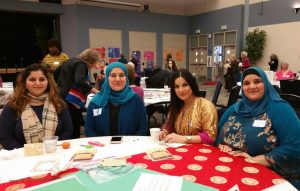 Zozan with her sisters.[/caption]
While she still thinks about going back to school, her dreams now are a little different that they were in high school. Instead of children, she is now more focused on supports for refugee parents. Kids learn faster than their parents and are the focus of a lot of support already. Zozan believes parents need a lot of extra support in cultural and language barriers. For now, she does this through medical interpreting and as an assistant teacher in the ESL department at Highline College. “If someone needs help and I can do it, I will be there. If I can’t do it, I will try.”
In her spare time, Zozan runs a catering company with her sister and advocates for food system change in South King County. Becoming a FIN Food Advocate was a natural fit because she is passionate about helping people see their options and keep moving toward the future. She and her sister have also received training and help in their business through FIN. “You get and you give,” she says, “it’s a circle that way.” She asks us all to be open to possibility, if you don’t try new things and ask for help you will never get what you want.
Zozan with her sisters.[/caption]
While she still thinks about going back to school, her dreams now are a little different that they were in high school. Instead of children, she is now more focused on supports for refugee parents. Kids learn faster than their parents and are the focus of a lot of support already. Zozan believes parents need a lot of extra support in cultural and language barriers. For now, she does this through medical interpreting and as an assistant teacher in the ESL department at Highline College. “If someone needs help and I can do it, I will be there. If I can’t do it, I will try.”
In her spare time, Zozan runs a catering company with her sister and advocates for food system change in South King County. Becoming a FIN Food Advocate was a natural fit because she is passionate about helping people see their options and keep moving toward the future. She and her sister have also received training and help in their business through FIN. “You get and you give,” she says, “it’s a circle that way.” She asks us all to be open to possibility, if you don’t try new things and ask for help you will never get what you want.
